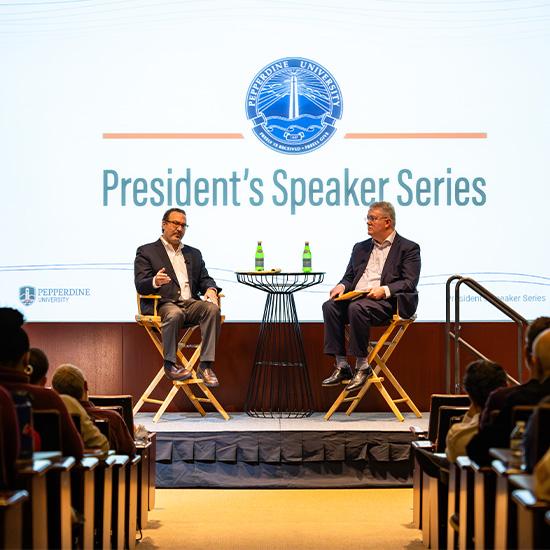David Schenker Discusses Middle East Geopolitics and Washington's Role at President’s Speaker Series

On Wednesday, January 24, 2024, David Schenker, Taube Senior Fellow and director of the Linda and Tony Rubin Program on Arab Politics at the Washington Institute, discussed current and historical Middle Eastern geopolitics at the latest President’s Speaker Series event. Moderated by Donald Earl "Trey" Childress, professor of law at the Pepperdine Caruso School of Law, the discussion, “Washington and the Crisis in the Middle East: A Conversation with David Schenker,” explored the trajectory of Schenker’s career in government, his insights on the complexities of international relations, and the importance faith dynamics have played in his role.
Childress began the conversation by asking Schenker to share his advice to students interested in pursuing a career in international relations. “In retrospect, I had no idea I would be able to make a career out of my fascination with the Middle East, but I worked toward what interested me,” he said. “Because I love what I do, it doesn't feel like work.” He added, “When you can, you should also write. I received several job offers as a result of people reading my work and was indirectly introduced to members of the government who were impressed by my writing and ideas.”
Childress also inquired about the state of the world during Schenker’s time working in the Department of Defense during the second Bush administration. “It was a heavy and heady time,” Schenker said. “We were on a war footing following the attacks on September 11, and I was responsible for countries in the Middle East that were under severe threat. While there were aspects that the administration got wrong, they had an interesting and coherent worldview about why we were attacked on 9/11 and on the collaboration of America’s adversaries in the region and beyond to engage in acts of evil.”
Childress followed up the question by asking Schenker to address the “clarity of purpose” Schenker experienced as part of the Bush administration and what changes in the region and in the world subsequent administrations had to manage. Schenker, who served in both the Department of Defense and at the State Department, replied that internal turmoil within the United States has been an obstacle for recent administrations as they have tried to find common ground on political issues.
“The United States has become increasingly polarized, starting with the Bush administration, throughout the Obama administration, and into the Trump administration,” said Schenker. “We dislike each other and disagree with each other more at home than we do with a lot of our adversaries throughout the world.”
Before opening the discussion to questions from the audience, Childress and Schenker spoke about the faith dynamics of his role in the State Department, particularly considering the complex role that religion has played in the Middle East’s history. He noted former vice president Mike Pence’s interest in the region’s religious minority groups, particularly in Iraq, where Pence had dedicated funds to rebuild the Christian communities devastated by the terrorist group ISIS.
“Much of the turmoil is compounded by an unstable government that is working with the Iranian-backed militias that are traveling to these areas and continuing to persecute the Chrisitian communities,” he said. “How we could remove these threats to religious minority groups was a top priority during my visits with the prime minister of Iraq.”
Schenker concluded the event by addressing audience questions, including how he, as a policy maker, considers history when making hard decisions in the present. “You have to spend time in the region to help understand what is going on in these countries,” he explained. “It’s hard to get your finger on the pulse, but you have to have an understanding to the best degree possible of what these people and governments are thinking before trying to enact change.”
Watch full-length broadcasts of previous President’s Speaker Series events on the President’s Speaker Series website.